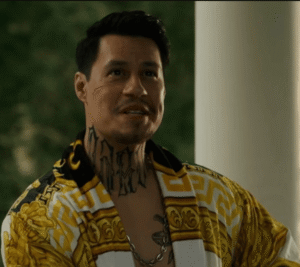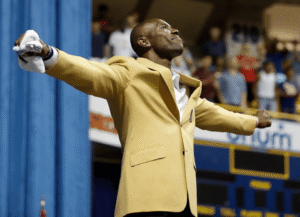Reflecting on ‘Scandal’: Columbus Short Joins Scoop B Radio Podcast
In this episode of Scoop B Radio, host Brandon “Scoop B” Robinson sits down with actor Columbus Short to reflect on his role in Scandal and the show’s impact. Their conversation dives into how the series blended entertainment with political themes, tackled issues of race and gender, and highlighted storytelling’s power to shape culture and societal dialogue.

YouTube
Introduction to the Podcast Episode
In the latest episode of the Scoop B Radio podcast, host Brandon ‘Scoop B’ Robinson welcomes actor Columbus Short for an engaging discussion that delves into the intricate world of the television series ‘Scandal.’ The podcast serves as a platform for insightful conversations that connect pop culture with pressing social issues, making it a must-listen for fans and critics alike. Columbus Short, widely recognized for his portrayal of Harrison Wright on the hit political drama, shares his experiences on set and the profound impact that the show had on both his career and the audience’s understanding of politics in America.
The episode promises to offer listeners an in-depth exploration of ‘Scandal,’ which has been lauded not only for its gripping storylines but also for its courageous engagement with contemporary political themes. Through a blend of personal anecdotes and critical analysis, Short discusses how the show demystified the inner workings of political life while challenging societal norms, particularly regarding race and gender. This discussion is particularly relevant given today’s political climate, as it reflects ongoing debates about representation and accountability in leadership roles.
Listeners can expect a dynamic conversation that transcends entertainment, exploring the pivotal role that ‘Scandal’ played in shaping public discourse around governance and ethical dilemmas. The episode invites both fans of the series and newcomers to reflect on the show’s lasting legacy and its relevance to current events. With Short’s authentic insights, the podcast encourages audiences to consider the implications of the narrative presented in ‘Scandal’ as they engage with real-world political dynamics. Ultimately, this episode serves as a reminder of the power of storytelling in fostering critical discussions about the complexities of our society.
Columbus Short: A Brief Overview of His Career
Columbus Short is an accomplished actor, dancer, and choreographer who has made significant contributions to the entertainment industry. Born on September 19, 1982, in Kansas City, Missouri, he began his career in the early 2000s with roles in various television shows and films. Short gained recognition for his appearance in the 2004 movie “You Got Served,” where he showcased his impressive dance skills, which became a defining aspect of his early career.
His portrayal as Harrison Wright in the critically acclaimed television series “Scandal,” which aired from 2012 to 2018, marked a significant turning point in his career. Through “Scandal,” Short portrayed a charming and intelligent character who adeptly navigated the complexities of Washington D.C.’s political landscape. The role not only amplified his visibility but also allowed him to engage with intricate political themes, a topic he expressed interest in during interviews. Short’s ability to seamlessly merge his acting with the show’s gripping narratives garnered him acclaim, and he became a fan favorite.
In addition to “Scandal,” Short’s career has included appearances in films such as “The Losers” and “Step Up,” as well as guest roles on various television shows. His broad skill set, which includes dancing and choreographing, has enabled him to forge a versatile career, appealing to a diverse audience. Furthermore, the challenges he faced in the industry, including personal struggles, have shaped his perspectives on race, politics, and the depiction of societal issues in his work. Short’s journey exemplifies the struggles many actors face while navigating Hollywood, often driving them to contemplate the broader implications of their roles in media.
The Impact of ‘Scandal’ on Culture and Society
‘Scandal’ made a significant mark on television by intertwining its dramatic narratives with real-world political events, creating a resonance with audiences that went beyond mere entertainment. The show, which brilliantly tackled themes of power, race, and gender, prompted widespread discussions that reflected the contemporary societal dynamics. As viewers watched Olivia Pope navigate the corridors of power in Washington D.C., they were not only engaged in her fictional escapades. Still, they were also drawn to the parallels with actual political scenarios, particularly in a post-Obama America, where race and representation became critical conversation starters.
The compelling storylines often mirrored real-life political crises and scandals, captivating audiences who saw their realities reflected in the show’s dramatic moments. The implications of such portrayals contributed to a broader dialogue about the intersection of media and politics, influencing public perceptions and societal discourse. Columbus Short, known for his role as Harrison Wright, emphasized this connection in recent interviews, noting that the show’s ability to evoke emotional responses was a testament to its storytelling prowess. He pointed out that audiences often felt empowered to discuss political issues, sharing perspectives on representation and integrity in leadership.
Moreover, ‘Scandal’ raised critical questions about the representation of minorities in media, challenging the status quo. By centering a strong African American woman in a high-stakes political role, the series stirred conversations about the inclusivity of diverse narratives in mainstream media. The legacy of ‘Scandal’ extends beyond its airtime; it initiated movements within the entertainment industry for more authentic storytelling and diverse representation. As viewers reflect on the show, it becomes increasingly apparent that its influence continues to shape conversations about politics and media representation in society today.
Behind-the-Scenes Access: A Unique Experience
Filming a politically charged series like ‘Scandal’ not only called for exceptional writing and acting but also demanded that the cast garner a deeper understanding of the political landscape. Throughout the production process, the cast, including Columbus Short, had the unique opportunity to immerse themselves in the world of politics. This included visits to Washington D.C., where they engaged with various political figures, allowing them to gain firsthand insights into the world they were portraying. Such experiences proved invaluable in crafting realistic narratives that resonated with the audience.
During their visits to Washington D.C., the cast met with influential political leaders and advisors, enhancing their understanding of the complexities of political maneuvering and influence. Columbus Short, who played the role of Harrison Wright, noted that these encounters provided them with a unique behind-the-scenes glimpse of how real-life politics operated. By interacting with individuals who navigated the intricacies of government, the cast members could infuse their performances with genuine emotion and authenticity. This level of engagement was crucial for establishing the show’s credibility, as it allowed the actors to draw on real experiences and perspectives.
Short emphasized that the narratives woven into ‘Scandal’ were not merely fictional constructs but were reflective of actual political scenarios. The cast’s experiences in the political sphere informed their character development and interactions, ensuring that the portrayals were not only captivating but also believable. This dedication to authenticity, bolstered by their behind-the-scenes access, ultimately contributed to the series’ acclaim and relevance during its run. As the show tackled complex themes, the synergy between real-world insights and scripted drama provided audiences with a compelling viewing experience that blurred the lines between fiction and reality.
Blurring Lines: Fiction vs. Reality in ‘Scandal’
In the realm of contemporary television, few shows have blurred the lines between fiction and reality as profoundly as Shonda Rhimes’ ‘Scandal.’ Columbus Short, a pivotal figure in the series, has articulated reflections on how the show’s narrative seemed to resonate with real-world events, particularly within the political landscape. The intense drama, characterized by power struggles and moral dilemmas, often mirrored the complexities and controversies in actual politics, prompting viewers to question the boundaries between scripted scenarios and the events unfolding in their daily lives.
Short emphasized that certain storylines in ‘Scandal’ had an uncanny way of aligning with prophetic real-world occurrences. This connection between the fictional narrative and actual political turmoil raises questions: Were these similarities intentional on the part of the show’s creators, or were they merely coincidental byproducts of the broader societal context in which the series was produced? The perception of intentionality could suggest that the creators possess a keen awareness of contemporary issues, using the platform of entertainment to engage with and comment on societal dynamics.
Moreover, the show’s exploration of themes such as power, betrayal, and moral ambiguity resonates strongly with the public’s disillusionment with political figures. This emotional engagement not only enhances viewers’ connection to ‘Scandal’ but also reflects a larger dialogue about accountability and governance in the real world. Such intersections prompt discussions among audiences and critics alike regarding the extent to which fiction can preemptively spotlight or critique genuine issues facing society.
Columbus Short’s insights prompt an examination of the relationship between art and reality, revealing that ‘Scandal’ is more than just a television drama; it serves as a lens through which audiences can explore and reflect on their political environment. As future developments unfold both in fiction and reality, the dynamics portrayed in shows like ‘Scandal’ will continue to invite reflection and dialogue.
Prophecy in Storytelling: Reflections from Columbus Short
In the realm of modern storytelling, the intersection between fiction and reality often blurs in intriguing ways. Columbus Short, during his recent appearance on the Scoop B Radio Podcast, elucidated the concept of prophecy in storytelling, emphasizing how the narratives crafted within television shows—particularly ‘Scandal’—anticipate actual political events. This phenomenon can create a distinct relationship between the medium and the audience, shaping perceptions and even influencing political discourse.
Short articulated how ‘Scandal’ managed to foresee certain political situations, highlighting the show’s uncanny ability to reflect real-world dynamics. The character-driven plots and dramatic scenarios portrayed in ‘Scandal’ serve not only as entertainment but also as a lens through which viewers can examine the complexities of real governmental affairs. The series, which navigated themes of power, morality, and treachery, inadvertently projected the essence of contemporary politics, reinforcing the idea that storytelling can serve a prophetic function. This reflection on storytelling speaks to the broader narrative often identified in the genre—where creators tap into societal undercurrents to craft tales that resonate with audience experiences.
Moreover, the impact of television storytelling on public perception cannot be underestimated. As viewers consume these dramatizations, they internalize ideas about political figures and the structures of governance portrayed in popular media. Short’s insights suggest that, as these narratives unfold, they possess the capacity to shape public sentiment. Therefore, the portrayal of political events in shows like ‘Scandal’ raises essential questions about the responsibility of creators: how can they balance entertainment with accurate representations of social realities? In this light, storytelling becomes a powerful tool in influencing real-world politics, reinforcing the idea that entertainment can lead to deeper societal reflections.
The Role of Politics in Film and Television
Columbus Short’s recent appearance on the Scoop B Radio Podcast shed light on the intricate relationship between politics and the realms of film and television. The portrayal of political narratives in entertainment has evolved considerably over time, often reflecting societal values and concerns. Short articulated how creators bear a significant responsibility in shaping public discourse through their works. With the power of visual storytelling to influence perceptions, filmmakers and television producers must carefully consider the messages they convey.
The intersection of politics and media is particularly crucial, as stories told on screen can shape understanding and engagement with political issues. For example, characters and storylines that embody real-life political struggles can serve as catalysts for dialogue, prompting audiences to reflect on their own beliefs and the political landscape. However, this power comes with the weight of responsibility. As Short noted, creators should approach political content not only with creativity but also with an awareness of the potential consequences their narratives may have on societal attitudes towards governance and activism.
Furthermore, Short emphasized that the impact of political narratives extends beyond the screen. When audiences resonate with a character’s struggle or triumph, they may be inspired to engage more deeply with the underlying issues. Conversely, misrepresentation or oversimplification of complex political topics can lead to misconceptions, fostering division rather than understanding. As such, creators are urged to strive for authenticity and depth when addressing political themes, ensuring that their work encourages thoughtful analysis rather than uninformed opinions.
In examining these dynamics, it becomes evident that political influence in film and television is both a privilege and a challenge. Creators must navigate this terrain skillfully to foster informed discussions while being mindful of the broader societal implications of their narratives.
Conclusion: Lessons Learned and Moving Forward
The recent episode of Scoop B Radio featuring Columbus Short provided an insightful reflection on his experiences with the acclaimed television series ‘Scandal.’ Throughout the podcast, Short shared valuable lessons drawn from his role, particularly the intricate relationship between entertainment media and political narratives. His insights resonate with current political dynamics, as the influence of media on public perception continues to evolve.
One of the key takeaways from the discussion is the reminder of how representation in media shapes societal understanding of political issues. Short emphasized that ‘Scandal’ portrayed realistic complexities within political systems, challenging viewers to engage critically with the information presented in both scripted and real-world scenarios. This connection underlines the importance of entertainment media as a medium that not only entertains but also educates and provokes thought about contemporary political challenges.
Additionally, Short’s reflections highlighted the responsibility of creators and actors in the political discourse. Their work has the potential to influence audiences and inspire change, fostering a more informed citizenry. The podcast stressed the importance of storytelling in communicating nuanced perspectives on minority experiences within governance and policy-making, reinforcing how essential diverse voices are in shaping political dialogue.
As we analyze the current political climate, it becomes evident that lessons from ‘Scandal’ can serve as a catalyst for discussions about accountability, integrity, and the role of media in democratic societies. By encouraging engagement with the content, Columbus Short’s appearance on the podcast reminds us that entertainment and politics are intertwined, paving the way for deeper societal understanding and proactive citizenship.
Call to Action: Engage with the Podcast
The recent episode of the Scoop B Radio Podcast featuring Columbus Short offers an insightful exploration into the intersection of politics and entertainment, particularly through the lens of the television series ‘Scandal.’ This show has not only captivated audiences with its dramatic storytelling but has also sparked critical discussions regarding political themes that resonate in today’s society. To fully appreciate the conversation and themes discussed in this episode, we invite you to engage with the podcast in multiple ways.
First and foremost, we encourage you to listen to the episode, which can be found on various platforms. By immersing yourself in the dialogue, you will gain a deeper understanding of how ‘Scandal’ reflects real-life political turbulence and the societal implications of such representations. Whether you prefer streaming on your smartphone or desktop, links to the podcast are readily accessible for your convenience.
Furthermore, we recommend subscribing to the Scoop B Radio Podcast to stay updated on new episodes that delve into a variety of themes that explore popular culture’s influence on politics and vice versa. Subscribing not only enhances your listening experience but also ensures that you do not miss any future conversations featuring notable guests like Columbus Short.
We also encourage our readers to share their thoughts on social media regarding the themes highlighted in the podcast. Engaging in discussions about ‘Scandal’ and its political implications can enrich your perspective and connect you with like-minded individuals. We invite you to use relevant hashtags, such as #ScandalPodcast and #ColumbusShort, to contribute to the conversation.
For those seeking further exploration of ‘Scandal’ and its profound impact on the political landscape, we have curated a list of resources including articles, interviews, and analyses that delve into the show’s themes. These resources will deepen your understanding and provide a wider context for the discussions presented in the podcast.





